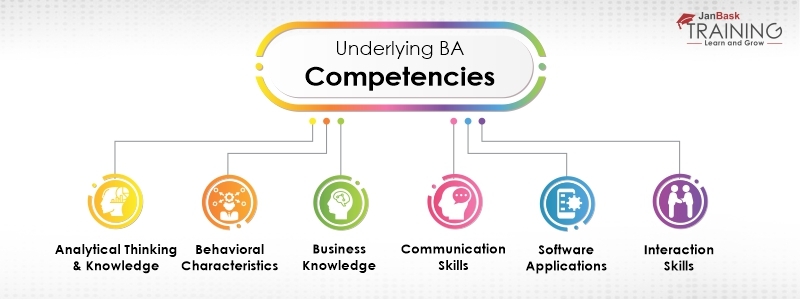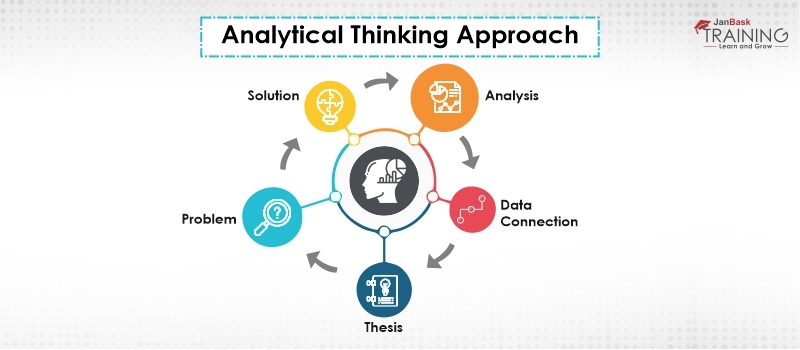09
JanChristmas Offer : Get Flat 50% OFF on Live Classes + $999 Worth of Study Material FREE! - SCHEDULE CALL
Apart from the business and technical expertise, every business analyst should have a behavioral skill set also because BA’s are people’s people. They deal with so many people in the organization of different age groups and having different authority levels. Thus, it becomes mandatory to be vocal for our thoughts, have a positive speaking body language and good convincing power. But these competencies build up with time and with multiple experiences once we start interacting with different folks in our organization. The reason why business analysts should possess these competencies is because they play a pivotal role in the business requirement and carrying out critical implementation.

This blog will take you through various competencies as -
These are very basic thinking skills which help to breakdown things into smaller chunks. It is the same as an analyst used his/her thought process when a new requirement comes in, which is very complex and multiple re-thinking skills are needed to break them down to write the user story. To be very specific analytical thinking is much above thinking out of the box. It is not only thinking about the new and innovative ideas but figuring out a connection between the new and the old one to derive a conceptualized solution.
As a business analyst, don’t we use creating thinking and interviewing skills during brainstorming sessions. Analytical thinking in such sessions includes helping others, to process their thoughts ahead of their normal boundaries and incorporating logical skills and value to connect the solution proposed by all stakeholders.

Analytical and Critical thinking always opens the path for a re-thinking mechanism and thus enables the BA to be a good Decision Maker. Decision Making in the world of business analyst refers to the capability to identify the action to facilitate any process. It’s the BA who should be able to decide which tools or techniques to use, which stakeholders to refer to, the priority of the business need, and which solution to proceed for.
We often come across multiple problems during the software development lifecycle, sometimes by developers, or by testers or by the client itself. It is the duty of the business analyst to analyze all the problems and should try to resolve them as quickly as possible. Sometimes it’s not in the hand of BA to resolve the issue, but he/she should be aware of the correct stakeholder for solving that issue. And, all this comes when a business analyst develops a strong problem-solving skill. Problem-solving needs strong mental skills so propose an analytical and creative solution.
As we already saw that BAs are people’s person and their interaction with everyone is of great importance for the project. So it a lot depends on their behavior as to how cordial they are, the moral behavior, the trust they build in their stakeholder relationship. Some of the important aspects are –
Read: Top 11 Business Analyst Skills Every BA Should Know About!
Business Analyst needs to be ethical in their behavior as well as in their thoughts. This is needed to earn the trust and respect of the stakeholders and thus helps to dissolve many arising conflicts. Whenever there is any ethical confusion, analysts should handle the situation with patience and react intelligently.
They need to be well organized in terms of their work, task alignment, requirement analysis, and priorities. A properly arranged work only results in a successful discussion rather than heading a meeting with un-organized information. Even meetings also should be planned well in advance so that BA has the idea of everyone’s availability.
The other aspect of behavioral characteristics is gaining and also maintaining trust with all the stakeholders. And trusts are being built only when the business analyst is ethical and is well organized in his/her tasks. Now once the BA gains the trust, it’s the duty now to maintain that trust and make sure that due diligence is provided in meeting the business and customer needs. Being trustful helps the business analyst in making quick decisions as it makes it easy to get the recommendations accepted.
Tableau Online Training & Certification

Business Knowledge comprises multiple other aspects such as protocols, principles, industry knowledge, organization level information, which should be common among all stakeholders. The departments who practice business principles in any firm could be Human Resource, Sales and Marketing, Leadership and Management, IT and they all need to have a common understanding.
It is important for business analysts to understand the market and the industry, and this only comes after huge analysis effort is put across to understand the running business, competitors, and demand and supply. That’s why it is always recommended that a BA should have a stronghold on the domain and the product to get a good grasp on the business of the organization.
Key Elements of Business Knowledge are -
Tableau Online Training & Certification
Read: The Ultimate Guide to Business Analysis Framework

A business analyst needs to interact with so many people in the organization, outside the organization and that too through various mediums. He/She needs to be very careful about the communication as it is not about the words that come out but also the way it is being conveyed. Good communication happens only when the receiver is able to understand the message.
In oral or verbal communication which happens in meetings, over the calls, some verbal discussion, BA needs to take care of body language and tone, as they play a major role in communication. More than that, effective communication skill is developed by the BA only when he/she becomes a good and active lister. This enables the business analyst to have healthy communication over any discussion.

Business analysts also acts as a guiding mechanism for the development and testing team. BA’s gives user stories, conduct brainstorming and walkthrough sessions, and everyday standups. This includes a combination of both verbal and written communication, thus it becomes important that whatever is being communicated is well understood by the team.
The bigger challenges come in written communication where the receiver interprets everything as per their understanding. It is recommended for the business analyst to use assertive communication in case of written communication and always be specific about all the details being mentioned.
By now, we know that a BA needs to interact with so many people in the organization and every interaction needs to be a healthy one.
Business Analyst facilitates connection and talks between various stakeholders to bridge the gap. They also ensure that there are no conflicts in their understanding and try to create a collaborative situation among themselves. As a business analyst one should be aware of all five negotiation styles so as those can be used as tools in various crisis situations.

Read: Supply Chain Management Is So Famous, But Why?
Business Analyst always works as a leader and influencer for the team. The team gets motivated the way business analysts carry the entire team. BA should always encourage the team to work together, have a collaborative approach, achieve shared goals and represent a team.
At the same time, the business analyst also works as a team member with other business analysts in the organization to mutually understand the work and have common business goals. BA needs to ensure that there is a sense of trust that is being built up and there is no authoritative nature coming in.
Business Analyst used multiple tools in day to day activity. Some of them are common for all BA’s and some are specific.
The general tools which are being used are - Microsoft Office Suite, Emails, Skype (or any other chat tools), project management tools - JIRA and Confluence being the latest one.
But based on the domain, industry, and technology they might also use some high-level tools. For example - Any business analyst working on client-side might deal with multiple servers (Vm boxes), SQL server, and also various ticketing systems like CA Service Desk.
There are BA’s who specialized in Content Management Tools, Document Management Tools or even in CRM. It all depends on the type of work any analyst is supposed to perform in the organization. All the tools which support his/her work and help to meet business goals get added to his/her competency.
Tableau Online Training & Certification

So for any business analyst, it’s not only the technical skills that work but these soft skills which play wonders to accomplish their tasks smoothly. It is very important for all analysts to have these skill sets and to carry them in their work-place. These can be game-changers during the course of work. I hope you had a great learning experience with us. Happy Learning Learners!!
Read: Master The Skills Of Project Management Tools & Be Successful
 Pinterest
Pinterest
 Email
Email
I believe in knowledge sharing and bringing change in people's lives. As a business analyst by profession, I love to explore everything about the way businesses should drive. I keep in touch with the latest business analysis updates.

Cyber Security

QA

Salesforce

Business Analyst

MS SQL Server

Data Science

DevOps

Hadoop

Python

Artificial Intelligence

Machine Learning

Tableau
Search Posts
Related Posts
Receive Latest Materials and Offers on Business Analyst Course
Interviews